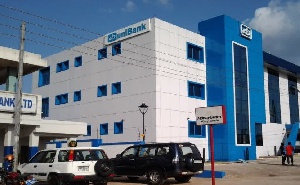Nii Amanor Dodoo, the Receiver of Unibank, says the bank disbursed GH¢28million in two equal tranches of GH¢14 million on January 6, 2016, and November 11, 2016, into two new loan accounts, including that of Fuzak company.
Nana Agyei Baffour Awuah, Counsel for Benjamin Ofori, a former Executive Head of Credit Risk of Unibank, suggested to the Receiver that the disbursement of an amount of GH¢14 million into a fictitious account on January 6, 2016, could not have been sanctioned by his client as Ofori’s request for the opening of additional accounts was dated January 19, 2016.
The Receiver disagreed with the suggestion, saying he tendered in evidence various memos initiated by persons, including Ofori in support of the opening of these fictitious accounts.
The Receiver was answering questions in cross-examination by lawyers for Ofori.
The accused persons in this matter have been charged with fraudulent breach of trust, money laundering, dishonest appropriation, wilfully causing financial loss to the Republic, and conspiracy to commit a crime.
At the time the license of Unibank was revoked, it was discovered that an amount of 5.7 billion cedis had been dishonestly appropriated by the shareholders with the connivance and assistance of some of the accused persons.
The Receiver could not identify any part of the memos which specifically indicated that Ofori requested the creation of additional current accounts.
He explained that the email by Ofori dated January 19, 2016, was just an example given to support how violations of procedures in opening current accounts were done.
Nana Awuah again suggested to the Receiver that there seemed to be no evidence suggesting that Ofori requested for the creation of the fictitious accounts into which the GH¢28 million was disbursed on January 6, 2016, and November 11, 2016, the Receiver answered that the fact that the memos did not contain evidence of the request to create additional accounts did not mean there was no such evidence.
He said the banking system was designed in a way that when a loan was disbursed into the loan account, the said sum was concurrently transferred/credited to the current account of the customer.
The Receiver testified that he found an email dated January 19, 2016, from Ofori seeking approval to open an additional current account.
He said Ofori had no business requesting for accounts to be opened as he sought to do by his email, as that was not the procedure in Unibank for opening new current accounts.
The Receiver testified that most of the customers, in relation to whom fictitious accounts were created, were unaware of the existence of these fictitious accounts.
He said others, however, got to know of loans being credited to their accounts without their knowledge and applied for the reversal of these loans.
He explained that when he engaged the Managing Director (MD) of Fuzak to repay the loan balance on Fuzak’s fictitious account, the MD indicated Fuzak never applied for any such loan.
The Receiver said the MD explained that when he realized that Fuzak’s regular account was credited with the loan proceeds of GH₵ 14 million, he approached the Relationship Manager, who informed him the said amount was credited erroneously.
“The amount was therefore reversed,” he added.
The defence said the narration purportedly from the MD of Fuzak was just a ploy by Fuzak to avoid repaying its debts, indicating these narrations could not be credible.
The Receiver further testified that on January 26, 2016, the amount of GH¢14 million earlier credited to Fuzak’s account was transferred from the account to Unibank’s shareholders’ account without Fuzak’s authorization.
The Receiver said that even though the transaction was reflected in the statement on Fuzak’s regular account, he did not cite any official complaint from Fuzak.
He had earlier testified that fictitious loans of more than GH¢1 billion were created in the names of identified customers of the bank.
The funds credited were subsequently debited by Elsie Dansoa Kyere, the then Head of Corporate Banking) and Benjamin Ofori, a former Executive Head of Credit Risk at Unibank.
He also told the court that these fictitious loans were created based on memos generated by Danssoa Kyere, Jeffrey Amon, and Ofori.
Business News of Saturday, 15 July 2023
Source: GNA
Unibank disbursed GH¢28 million in two equal tranches - Receiver tells court
Entertainment
















